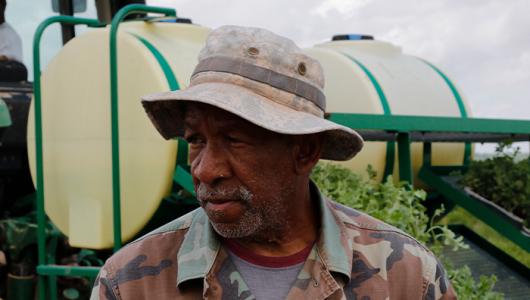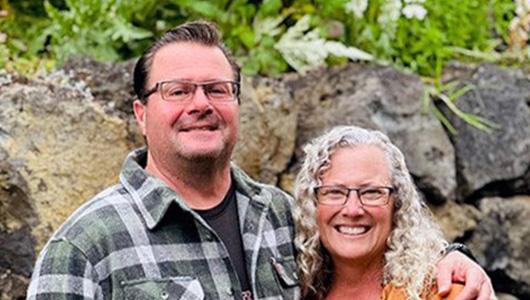This Friday, meet Kristen Maness, owner of Roots of Truth in Morrilton, Arkansas. Life changed course for Kristen after an accident left her with serious injuries. Everyone deals with adversity differently, and Kristen decided to turn her challenges into new beginnings. She chose to grow flowers.
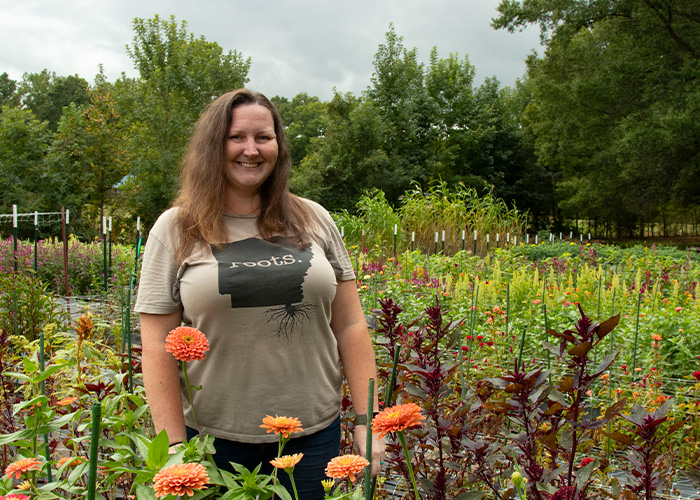
A fall from a ladder at Kristen’s retail job caused her to fracture multiple bones in both of her feet. She was confined to a wheelchair for 15 months and used crutches for 11 more. Kristen’s surgeon told her it would be a life-altering injury, and since her accident, she has undergone 15 surgeries and counting.
Making a Change
While her injuries ended her retail career and other accessible options didn’t appeal to her, she and her family made the decision in 2017 to purchase land in Morrilton to pursue homesteading, starting with a vegetable garden. Soon after, she got her hands on a copy of Cut Flower Garden by Erin Benzakein and began reading voraciously about the cut flower industry. She was astonished to learn that a multi-billion-dollar industry was largely reliant on imports from other countries, and this didn’t sit well with her.
“I believe you’re taking the essence—the life—out of these beautiful things when you mass produce them and ship them far and wide,” she said. “I decided I wanted to see more locally grown flowers right here in my state.”
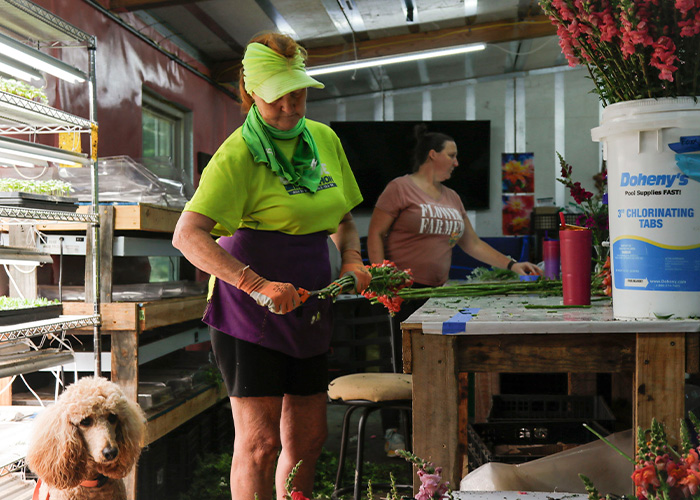
She soon realized she could make a good living growing flowers. She began planting zinnias in her vegetable garden and mowing her property to make room for more blooms. One day, she and her mother loaded their flowers into a van and delivered them to nearby florists just to see what would sell. To their surprise, the florists eagerly bought out everything they had. From there, her dream of owning a cut flower farm took root, but she needed help getting started.
A Unique Challenge
Kristen was advised to visit her local USDA Natural Resources Conservation Service (NRCS) field office, where she met Conway County District Conservationist Tiffany Williams and her staff. They formed a mutualistic relationship: NRCS provided technical assistance and checklists to keep Kristen on target, and Kristen gave them a unique challenge.
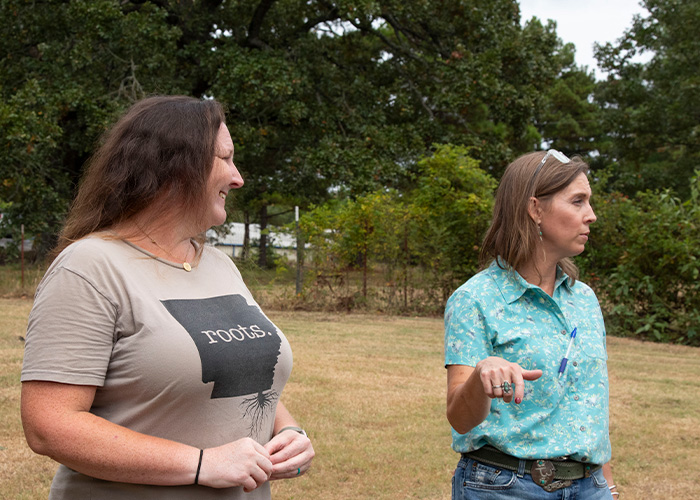
“I had never worked with an operation anything like this before. We were under some restrictions because Kristen’s operation is situated on wetlands, which creates growing challenges, and we have to be careful not to impact the wetland determination,” Tiffany explained. “But we are constantly finding ways to make her operation run smoothly and efficiently. She is still heavily affected by her injury, but she’s still doing it all.”
With the help of NRCS, Kristen has implemented a high tunnel, raised beds, low tunnels, a new water pipeline, micro-irrigation, a nutrient management plan, a pest management plan, crop rotation, no-till, cover crops, and more through Environmental Quality Incentives Program (EQIP) and Conservation Stewardship Program (CSP) contracts.
“Before, the ground was so wet that everything I tried growing would just rot and die,” Kristen explained. “Now, with NRCS’ help, I can control the water on my land, where it is and how much there is, and get my plant’s roots in the soil. Plus, Tiffany’s notes keep me on track!”
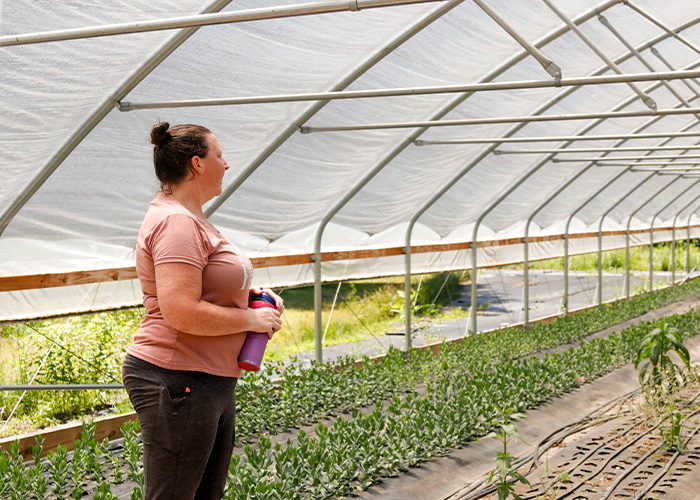
Becoming a Role Model
With NRCS by her side, along with her own extensive research, her background in business and interior design, and support from her mother, coworkers, and cut flower collectives, Kristen’s farm has flourished. Every week, she sells to florists from Sherwood to Van Buren, often making four-hour round trips. Thanks to her consistency and loyal clientele, she has doubled her profits almost every year since starting her business. Her stunning flowers, arranged in bouquets, have even been featured on the covers of bridal magazines.
Demand for her flowers far exceeds what she can supply, which recently led her to join forces with local farmers and other growers to form her own cut flower collective. This allows her to better meet customer demand and grow her business despite the limitations of her land.
“I’ve always loved hard, physical labor. My grandfather instilled it in me,” Kristen said. “That accident could have put me at a desk job, but that sounded like punishment to me. I wanted to be outdoors. And here I am today, spending time outdoors and doing what I want to do with my business.”
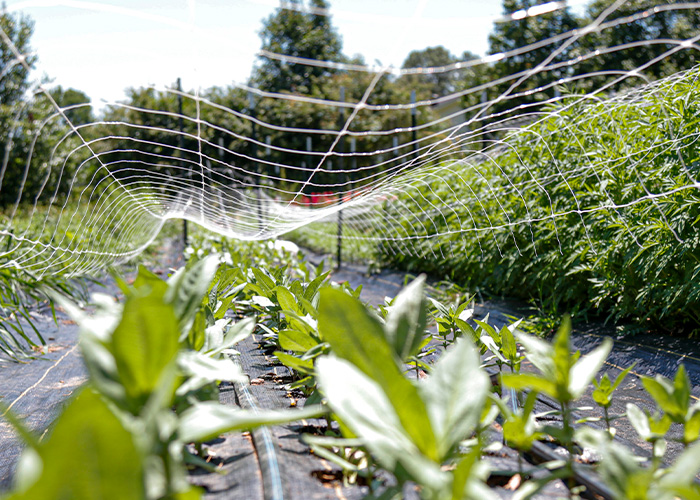
Though she still endures extreme pain in both feet, she refuses to let it stop her and she is empowered to do more. In fact, her own adversity called her to become a board member of the nonprofit Accessibility Across Arkansas, which provides adaptive equipment and accessibility consulting to recreational organizations across the state.
“I like that my kids get to see what people are capable of doing,” she said. “I like being a good role model for them. They can say that their mom had this horrible accident, but she didn’t let that kill her spirit. I’m really proud of that.”
More Information
Visit local farms, ranches, forests, and resource areas through our Fridays on the Farm stories. Meet farmers, producers, and landowners who are working to improve their operations with USDA programs.
USDA offers a variety of risk management, disaster assistance, loan, and conservation programs to help producers weather ups and downs in the market, recover from natural disasters, and invest in improvements to their operations. Learn about additional programs.
For more information about USDA programs and services, contact your local USDA service center.
Claire Kausch is a public affairs specialist for NRCS in Arkansas.

